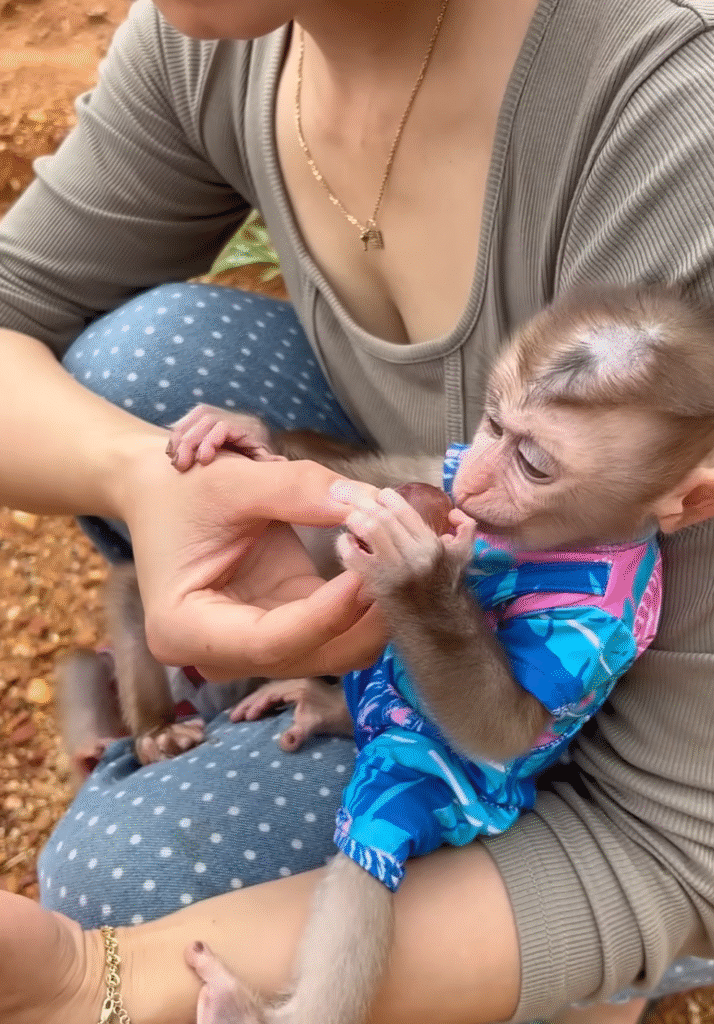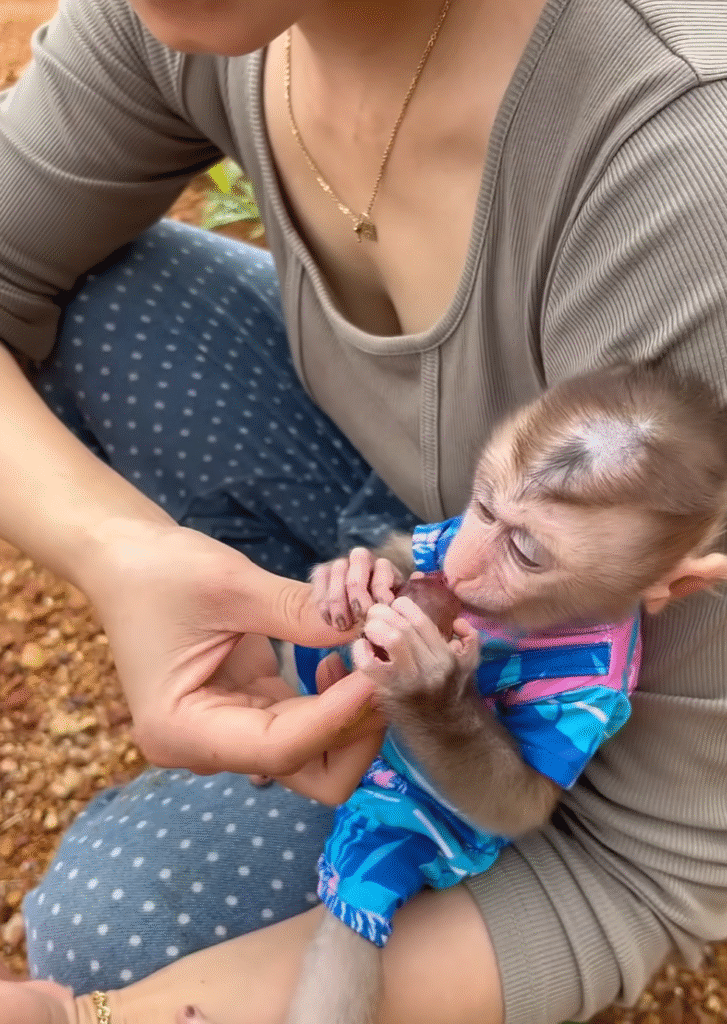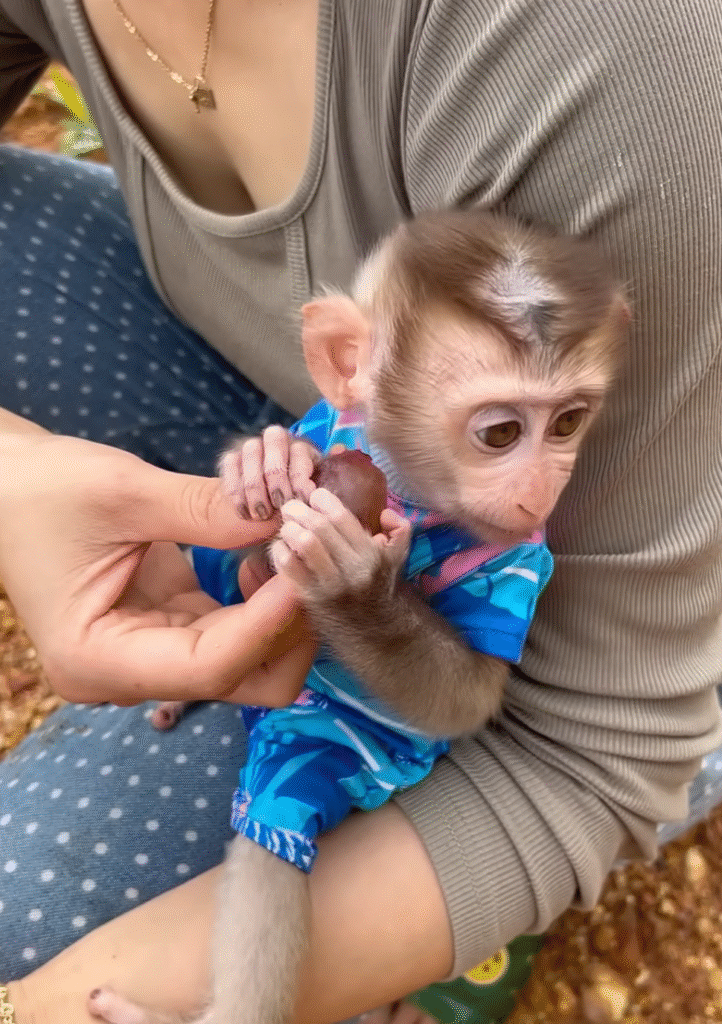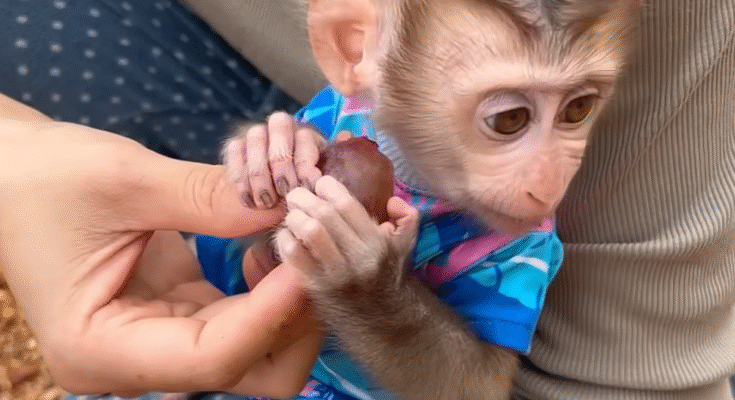In a quiet little village surrounded by tall banana trees and green rice fields, a gentle woman named Lina had become known for her kindness toward animals. Every morning, she could be seen carrying a basket filled with ripe fruits — mangoes, bananas, papayas, and guavas — walking toward the big banyan tree near her home. But these fruits weren’t for her family. They were for a small, mischievous monkey named Bobo.
Bobo had appeared one morning out of nowhere, skinny and shy, hiding behind the tree and watching Lina’s children play. He had lost his troop somewhere in the nearby forest after a heavy storm, and his frightened eyes told a story of hunger and loneliness. Lina noticed him, crouching near her fence, and her heart melted immediately.

“Poor little one,” she whispered. She went back inside, peeled a banana, and softly placed it on the ground near him. Then she stepped back, sitting quietly to give him space. At first, Bobo didn’t move. He tilted his head, sniffing the air suspiciously. But the smell of ripe banana was too tempting. Slowly, he crawled out, grabbed the fruit with his tiny hands, and began to eat.
That was the start of a beautiful friendship.
From that day on, Lina made sure to save some fruits every morning for Bobo. At first, he came timidly, waiting for her to leave before he approached the basket. But within a few days, his fear turned into trust. When Lina called softly, “Bobo! Come, my little one,” he would jump down from the banyan tree and run straight to her, tail swinging joyfully.
Her children loved to watch him. “Mom, he’s like a baby!” her daughter said. And indeed, Bobo behaved like one — playful, curious, and full of energy. Sometimes, when Lina wasn’t careful, he would snatch the fruit straight from her hand and run up the tree, looking down proudly as if he had won a game. Lina would laugh, shaking her head. “Greedy boy! You couldn’t even wait a second.”

One sunny afternoon, Lina decided to prepare a special fruit plate for Bobo. She sliced sweet mangoes, peeled tiny bananas, and cut papayas into little cubes. She even added a bit of watermelon because she had noticed how much he loved the juicy red fruit. When she stepped outside, Bobo was already waiting, sitting on a low branch, eyes sparkling.
“Ah, you knew I was coming, didn’t you?” Lina teased. Bobo clapped his hands, chattering excitedly. She placed the plate on a clean rock and sat beside it. To her surprise, instead of grabbing all the fruits at once, Bobo sat down next to her. He picked up one piece of mango, looked at her, and offered it to her first. Lina smiled and pretended to eat it.
“You’re sharing now, hmm?” she said softly. “Such a good boy.”

That small gesture touched her deeply. It showed that Bobo had learned something important — not just to eat but to give. She realized that her gentle feeding and loving care had taught him kindness without words.
Over time, their bond grew stronger. Bobo began to follow Lina to the garden, climbing trees while she worked. He would help in his own funny way — shaking the branches until ripe fruits fell, then clapping proudly as Lina picked them up. Sometimes he carried small fruits to her basket, though he always “taxed” a few for himself first.
The villagers often came to watch. Children laughed as Bobo sat patiently beside Lina, waiting for his turn to be fed. Some adults shook their heads and smiled. “You treat that monkey like your own child,” one old man said.
Lina simply smiled. “Every creature deserves love,” she replied. “He understands my heart better than most people do.”
As months passed, the seasons changed. When fruit became scarce, Lina still found ways to feed her little friend. She bought bananas from the market, saved leftovers, and even planted new trees around her yard so Bobo and his forest friends would never go hungry.
One cold morning during the rainy season, Lina noticed that Bobo didn’t come. She waited near the banyan tree, holding her fruit basket under an umbrella. But he was nowhere to be seen. Her heart ached with worry. She called his name softly again and again, but the only sound was the falling rain.
For three days, Bobo didn’t appear. Lina couldn’t stop thinking about him. Had he gotten lost? Hurt? She even dreamed of him shivering alone under the rain. On the fourth day, just as the sun broke through the clouds, she heard a faint chatter.
She ran outside — and there he was! Wet, dirty, and thinner, but alive. Bobo limped toward her with a tiny cry. Lina dropped her basket and knelt, tears in her eyes. “Oh, my poor baby, you came back,” she whispered.
She quickly wrapped him in a towel, drying his fur and feeding him warm banana pieces from her hand. Bobo held onto her tightly, pressing his little head against her shoulder. From that day on, he never wandered far again.
The story of “the mother who feeds the monkey fruit” spread through the village. People admired Lina’s patience and compassion. Many began leaving food near their homes for birds, squirrels, and even stray dogs. Lina’s kindness had inspired a quiet movement of care.
One morning, something beautiful happened. Bobo arrived at Lina’s house carrying a surprise. In his tiny hands was a bunch of wild berries. He placed them on her lap and squeaked proudly, as if saying, “Now I bring food for you, too.” Lina laughed, her heart swelling with joy.
“Thank you, my sweet boy,” she said. “You’ve learned to give back.”
That simple act reminded her that love always finds a way to return. The bond between them wasn’t built on words or expectations — it was built on trust, patience, and kindness shared through something as simple as fruit.
From then on, every feeding became a little celebration. Lina would sit under the banyan tree with a plate of colorful fruits, and Bobo would come dancing down, sometimes bringing along other monkeys who watched curiously. Instead of chasing them away, Lina welcomed them too. “There’s enough for everyone,” she would say, smiling.
As the sun set each evening, she’d look up at the trees and see Bobo sitting quietly, munching on his fruit, eyes half-closed in peace. She realized that even though he was a wild animal, love had bridged the gap between their worlds.
Years later, when Bobo grew older and stronger, he started spending more time in the nearby forest. But he never forgot his “mother.” Every morning, Lina would still place fruit on the rock under the banyan tree. Sometimes, she wouldn’t see him for days. But one way or another, the fruits always disappeared, and a few mango leaves or berries would appear in return — a silent thank you from her dearest friend.
And so, the story of Lina and Bobo became part of the village’s heart — a living reminder that when a mother feeds a hungry soul, whether human or animal, she’s feeding the world with love.
Even today, when the wind blows through the banyan leaves, villagers say they can still hear the soft laughter of a woman and the playful chatter of a monkey sharing fruit under the golden afternoon sun — a timeless moment of love, kindness, and connection that no storm could ever wash away.



